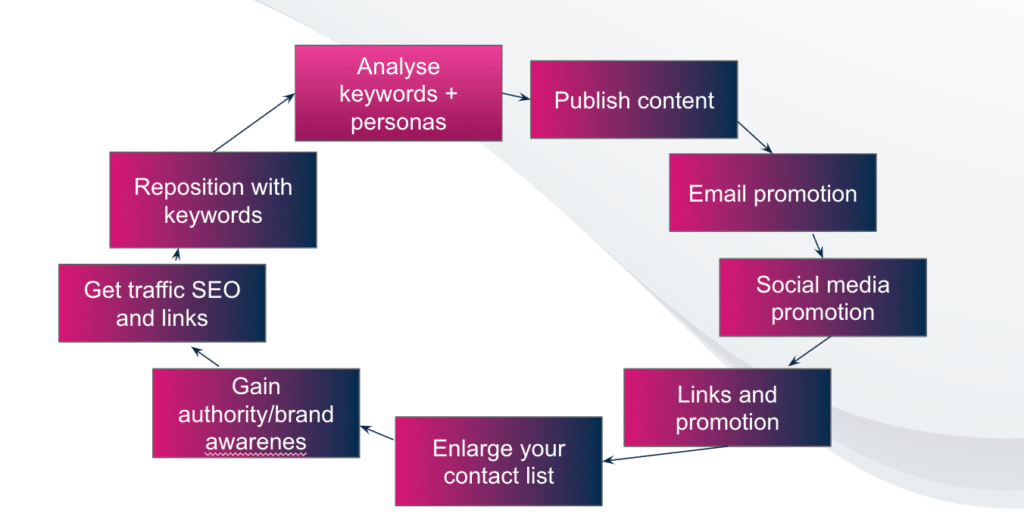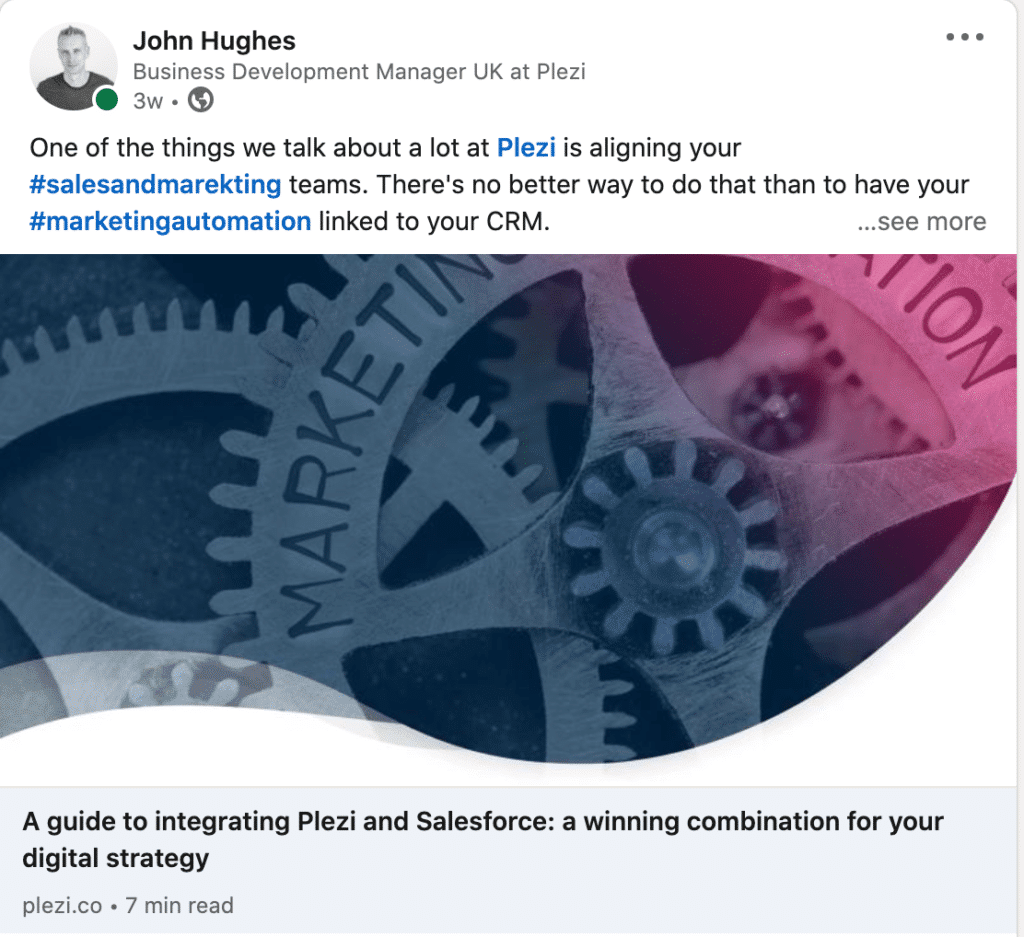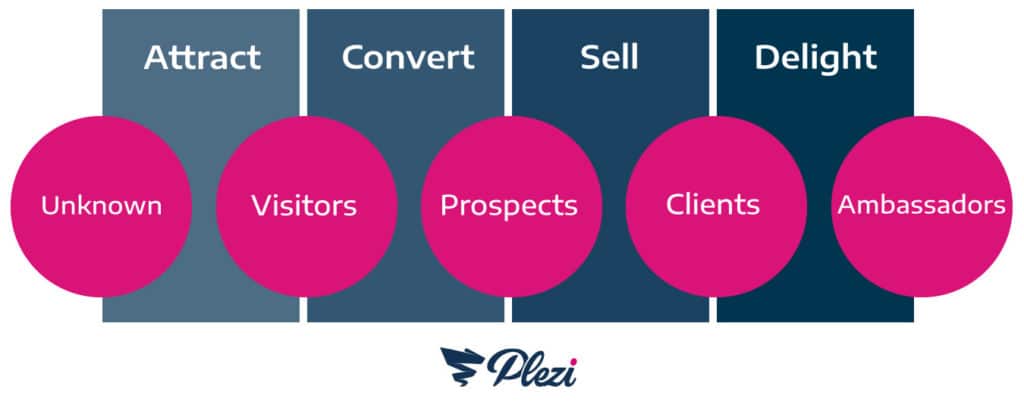Developing strong business relationships with both your prospects and existing customers is more important than ever. But in today’s uncertain business environment, it can be a challenge for many companies to win people’s trust. And how do you build those relationships if you have the added hurdle of not being able to hold live events or meet prospects and customers face-to-face? The answer is by using an inbound marketing strategy to provide them with valuable online content that is tailored to their specific needs.
What is Inbound marketing?
Inbound marketing is a digital marketing strategy that aims to attract target customers to your products and services. It is based on creating and sharing high-quality content online like blog posts, whitepapers, and webinars that are tailored to the specific needs of your buyer personas.
Unlike outbound marketing, which aims to create awareness and reach the biggest audience possible, the goal of inbound marketing is to build a relationship with target prospects by increasing their knowledge or solving their problems.
Strong relationships with both potential and existing customers are vital for your business’s success. And not only because it costs up to five times as much to acquire a new customer than to keep an existing one. Those relationships are also your greatest asset in times of business uncertainty.
Inbound marketing can help you build these relationships while also keeping your marketing costs to a minimum. It is far more cost-effective than a traditional marketing approach based solely on advertising. Studies say that an inbound marketing strategy costs on average 62% less than outbound marketing methods and generates over three times as many leads.
How inbound marketing builds strong business relationships
Inbound marketing can help you build strong relationships with prospects and customers at every stage of the marketing funnel and beyond; from when your website first appears in search results until after customers have made a purchase.
1. Increases brand awareness
Buyer behaviour has changed a lot in a very short period. While there is still a time and place for outbound marketing techniques, the internet has provided buyers with all the information they need to educate themselves about products and services. Research says that 94% of B2B buyers currently research products or services online before making a purchase.
But you can’t build a relationship with them if they don’t know you exist. By consistently creating great content that uses SEO techniques to rank well in search engine results, you multiply the possibilities of being found. You also greatly increase the visibility of your offering online and awareness of your brand.
The bonus is that those prospects that find your website when researching a specific problem are already much more likely to be interested in what you have to offer. And as a result, they’ll be much more likely to visit your website. In other words, they start to qualify themselves.
2. Drives traffic to your website
For most businesses, organic search is now a bigger source of website traffic than paid sources. Leads that are acquired as a result of organic search for content are also 8 times more likely to result in a sale.
Perhaps more importantly, by letting visitors find you in search results or on social media, your company also appears like a more credible source of information in their eyes than an advertisement they probably never wanted to see in the first place.
Using an inbound marketing strategy to create content and distribute it via a number of different channels can significantly increase traffic to your website. And obviously the more traffic you have coming to your website, the more chances you have of developing your relationship with them. At Plezi, we also us our content to drive traffic to our site and use other channels to distribute that content so as many people within our target market can see it.
 3. Converts visitors into leads
3. Converts visitors into leads
Once you have attracted visitors to your website, your goal is to convert them into leads. Inbound marketing lets you collect information about visitors (including their email address) in exchange for valuable content called lead magnets, for example, white papers and webinars. This enables you to further add to what you know about them and also helps you better tailor your marketing actions to their specific needs.
Some 63% of B2B buyers say that they would be happy to provide their contact information to access webinars, and just under half would be happy to do so in exchange for a white paper. That’s incredibly important, because by allowing you to contact them directly using their email address, prospects are indicating that they are happy to take the relationship further if you offer them purpose-driven content.
4. Nurtures leads into customers
Of course, the whole point of collecting information from leads is so that you can hopefully turn them into customers. And yet most of the leads you generate on your website won’t be ready to buy straight away. Instead, you’ll need to demonstrate to them exactly how they can benefit from using your product or service.
To do this, inbound marketing lets you provide the right content to the right buyer persona at the right time to nurture them towards purchase in a process called lead nurturing. By doing this, you significantly increase the chances of leads becoming customers.
And that isn’t the only benefit. Companies that take the time to nurture leads as part of an inbound marketing strategy make 50% more sales at 33% less cost compared to those that don’t nurture leads. A study by the Annuitas group also says that leads that have been nurtured make 47% larger purchases than leads that haven’t been nurtured
5. Multiplies opportunities for engagement
There are a number of advantages to sharing the content you create as part of an inbound marketing strategy on social media. Firstly, the more likes, comments, and shares your content has, the greater the number of people your content is going to reach. This further increases both brand awareness and, potentially, traffic to your website, helping to create a virtuous circle for content.

Secondly, it will let you receive almost instant feedback from both prospects and existing customers. This provides you with valuable information on what their specific needs are and enables you to improve both your offering and marketing processes as a result.
Engaging with users in this way and answering their questions will also let you further develop your relationship with them and contribute to another of inbound marketing’s key objectives: building trust.
6. Builds authority, trust, and loyalty
Trust is the basis of any healthy relationship, and yet winning the trust of customers can be a major challenge for many businesses. In the era of fake news, spambots, and AI-generated photos, the old marketing saying, “People do business with people they know, like, and trust” is probably more relevant than ever.
By consistently providing leads and customers with valuable content that demonstrates your expertise without requiring a financial transaction to take place, inbound marketing helps you build both your brand authority and trust with your target market.
Within your inbound marketing strategy, every piece of communication – whether it be articles, webinars, podcasts – will position your brand in the long term, as it will continue to work as a way to get leads, but also as a marker of who you are as a company and where you stand. We’ve been saying this a long time, but content marketing only helps to strengthen your brand image.
Being seen as a trusted source of information will give you a vital edge over your competitors when it comes time for your leads to make a purchase and help inspire customer loyalty once they do.
7. Turns customers into brand ambassadors
The inbound marketing process doesn’t just stop once you have converted your leads into customers. By delighting customers with valuable content throughout the marketing funnel and nurturing your relationship with them even after purchase, you’re much more likely to turn them into promoters of your business.
That matters because the single most credible form of advertising still comes from people we trust. 92% of B2B buyers are more likely to purchase a product or service after reading a trusted review. But around 70% also still trust online recommendations from people they don’t even know.
In addition, not only do online reviews increase conversion rates by as much as 270%, the acquisition cost of leads that come from these sources is virtually zero and they have a higher lifetime value.
Having strong relationships with prospects and customers is your business’s greatest asset during times of uncertainty and key to your success. But that can be a huge challenge if you can no longer establish those relationships face-to-face. By using inbound marketing to create valuable content for target personas at every stage of the marketing funnel, sharing it online, and engaging with users on social media, you can build those relationships with prospects and customers and win their trust. What more can you ask of a marketing strategy?
Have you used inbound marketing to build strong business relationships with prospects and customers? What results have you seen? Why not tell us about it in the comments section below?






 3. Converts visitors into leads
3. Converts visitors into leads 